
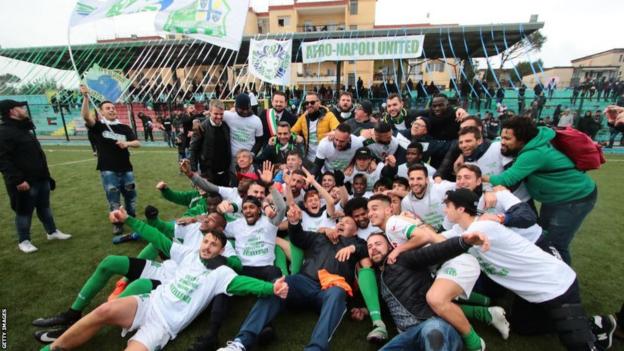
Football stirs the soul and grips the heart in Naples as much as anywhere else, but for those forging their own stories and new chapters in the shadow of Napoli’s Scudetto-winning champions, it also provides much-needed hope.
The city’s second club began life as Avro Napoli United in 2009. They have since boasted Maradona in their ranks, successfully pressuring FIFA and the rise of former players to reach Serie A and European competition.
The club’s journey included rising from the bottom of the Italian football pyramid to the fifth division. But athletic success is just a happy byproduct of their main goal.
Even more important is the fight against racism and discrimination as it helps migrants, asylum seekers and young people at risk of exclusion to find housing, jobs and a secure life.
“Football for us is not just a sport, we grew up playing in the street so it’s a way of life,” Luigi Di Nunzio, one of the club’s directors, told BBC Sport.
“It’s our teacher, it’s the way you learn how to relate to others, how to share a place, how to respect each other.”
I started with the regular pick-up game.
As happens all over the world, Di Nunzio and his cohorts often found themselves short of players, so they began asking strangers loitering outside their offices, near the central station in Naples, to join them.
They soon discovered that most had traveled from Africa in search of work and opportunities – with many of the original group working on social inclusion and human rights – Di Nunzio and his friends wanted to help their new teammates find their feet in the city.
“It was great, because we suddenly noticed it was a two-way relationship and it was very effective for both of us,” explains Di Nunzio.
“Anyone who has prejudices or prejudices about immigrants is really starting to understand and relate to them and suddenly starts to lose all of that prejudice.
From the point of view of immigrants, this was the most effective way to integrate into society.
“We think of bureaucracy, we think of housing, access to food and a job. But they usually form a close community and the integration stops at a certain level – we never notice an actual integration into the social life, the bonding with the local population.
“Football helped them do that, and we made a lot of friends.”
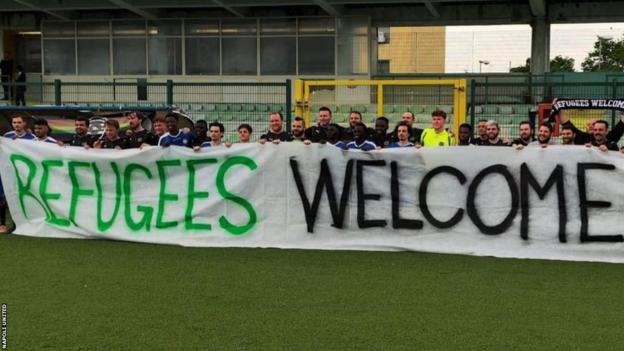
This informal kick-off soon developed into an 11-man club within which to deliver the project.
However, the club found that FIFA’s regulations on the registration of players from outside the European Union – designed to prevent illegal trafficking in players – initially prevented them from registering a mostly immigrant team into the league system.
They faced similar hurdles with the Italian governing bodies, but after a nationwide campaign, which included clubs and organizations active in the fields of immigration and integration, the Italian Football Federation amended its regulations to allow immigrants and refugees to represent the club.
They entered the league pyramid in 2013.
Alongside the Neapolitans were players from Cape Verde, Senegal and Ghana, giving Afro-Napoli United what Di Nunzio calls “a potent mix of culture, fitness and technique”.
“The word spread very quickly,” he adds. “We were able to gather a lot of people and a lot of interest from organizations that wanted to get involved or help. It was very natural.”
The project has grown to also include a women’s team, an amateur side, a youth sector and a futsal club. On Sundays, the community often gathers to watch the First Eleven in action.
They simply became Napoli United when players from South America and other European countries joined as well.
“When you enter the United Family, you enter into a web,” says Di Nunzio. “It means that we will help you with the bureaucracy, we will help you through our contacts to get a job, learn about the field of work and things like that.
“That’s the point of the project. Football is a tool for us, not the goal. To spread our values, we strongly believe we need to start at the grassroots level, start with the youth – we are a community and that is our strength.”
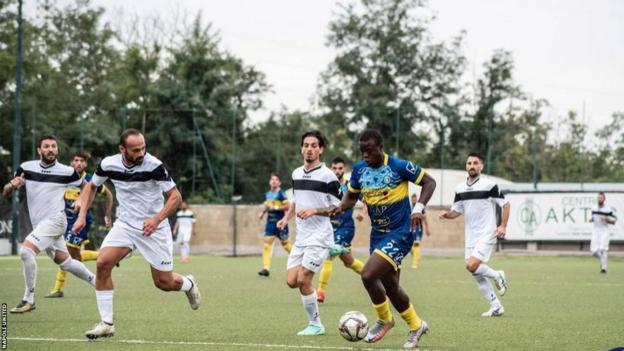
One of the players to have represented the club is striker Abou Sharif, who left Sierra Leone as a teenager during the 2013-15 Ebola crisis and was seen in a refugee camp after arriving in Italy.
“It’s a family,” Sharif says. “It’s a club that welcomes everyone. It’s something I would call a second home.” Football is a place where you find peace, a place where you make friends.
“Luigi is like a brother to me, he showed me a lot of love and helped me. If I call him to help me, he comes. It’s football, but they care about us.”
Sharif traveled to Italy by boat from Libya. His story is familiar. Like him, many United players have traveled and suffered, fleeing persecution or seeking a better life and wanting a chance to send money home to the families they left behind.
Sargo Conteh, who was smuggled through six countries to reach Italy, told BBCOS that “many people have lost their lives to come here”. So I can say that I am one of the lucky ones.
“Some people die in the water. Some people even die in the desert.”
“The flight is very normal,” DiNunzio adds. “Cross the desert and get arrested in Libya and you have to find your way out, whether it’s with money or whatever you can give, work.
“It’s not a good or easy ride. Most of the people I come in contact with have suffered, they have marks and scars on their bodies. It’s not easy at all. That’s why when you give them a chance, they’ll grab it.”
Napoli United became the first club to win four consecutive promotions after entering the league setup.
Some of their players rose faster and farther.
Among those following their career is 21-year-old defender Maissa Ndiaye, who arrived in Italy as an immigrant from Senegal, played for Napoli United, was scouted and signed by Roma and later joined Cremonese, who were relegated from Serie A. The end of last season.
Striker Dudu, who left Cape Verde for Europe, played Europa League football with Maltese side Hamrun Spartans and is now with Al Ain in the United Arab Emirates.
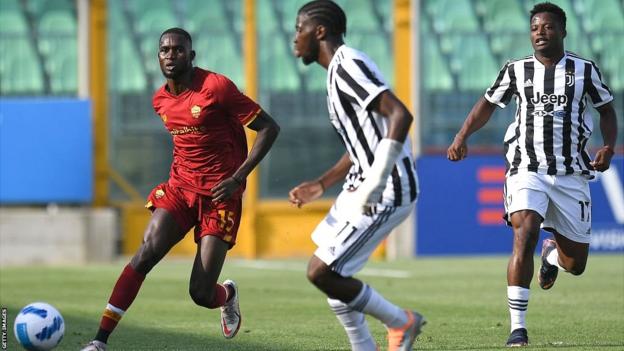
However, their most famous former players never reached those heights.
Diego Maradona Jr. was born and raised in Naples, following his father’s famous affair with a local woman.
During his much-travelled career that featured stints with Napoli’s youth teams and as a professional beach soccer player, Diego Junior represented Napoli United on the pitch, before returning as manager and guiding them to a play-off defeat at Serie D level, in the 2021-22 campaign.
His father was always outspoken about issues outside the game, and developed a friendship with former Cuban leader Fidel Castro, and along with Eric Cantona, Ray and Gianluca Vialli, among others, Establishment of the short-lived FIFPro in 1995.
Diego Junior was similarly drawn to the Napoli United job.
“He’s a good man, he lives our values, which is why it was so natural to have him involved in the project and he joined us very happily,” says Di Nunzio.
However, Diego Junior and Napoli left United on less favorable terms.
The club became financially stretched after the pandemic, with others at their level working on bigger budgets, and Maradona, emphasizing his “love and respect” for the project, He left in March to protest the “injustice” of not paying players and staff salaries.
Those economic issues have forced the club to think about its future and in June They announced a merger with ASD Quartograd, an anti-racist and anti-fascist club located in the suburbs of Naples with a similar focus on social inclusion projects. They will play Quarto Avrograd.
“If we seek partners, we need to find someone who shares our values, our point of view, and our purpose,” explains Di Nunzio.
“We’re not here to make money or get famous, we’re here to help people and be happy about the football we support.”
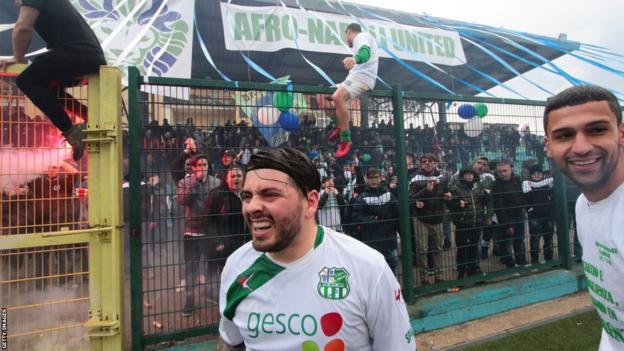
The hope is that the merger will provide a solid base for the two clubs to continue operating.
“We always thought we could get to a certain level and then have to stop for the good of the project itself—to remain ourselves, never to betray our values,” says Di Nunzio.
“Our model is not just about the value you claim, but the value you live by. We are trying to demonstrate solidarity is not an ideological exercise you do at your own expense.
“We are trying to prove that solidarity can be an economic model for sustainable development on the football field, in all sectors.
This is the reason for our motto “United we win”.

